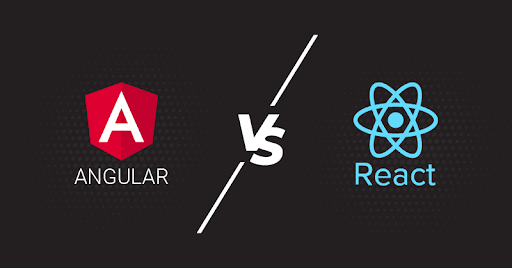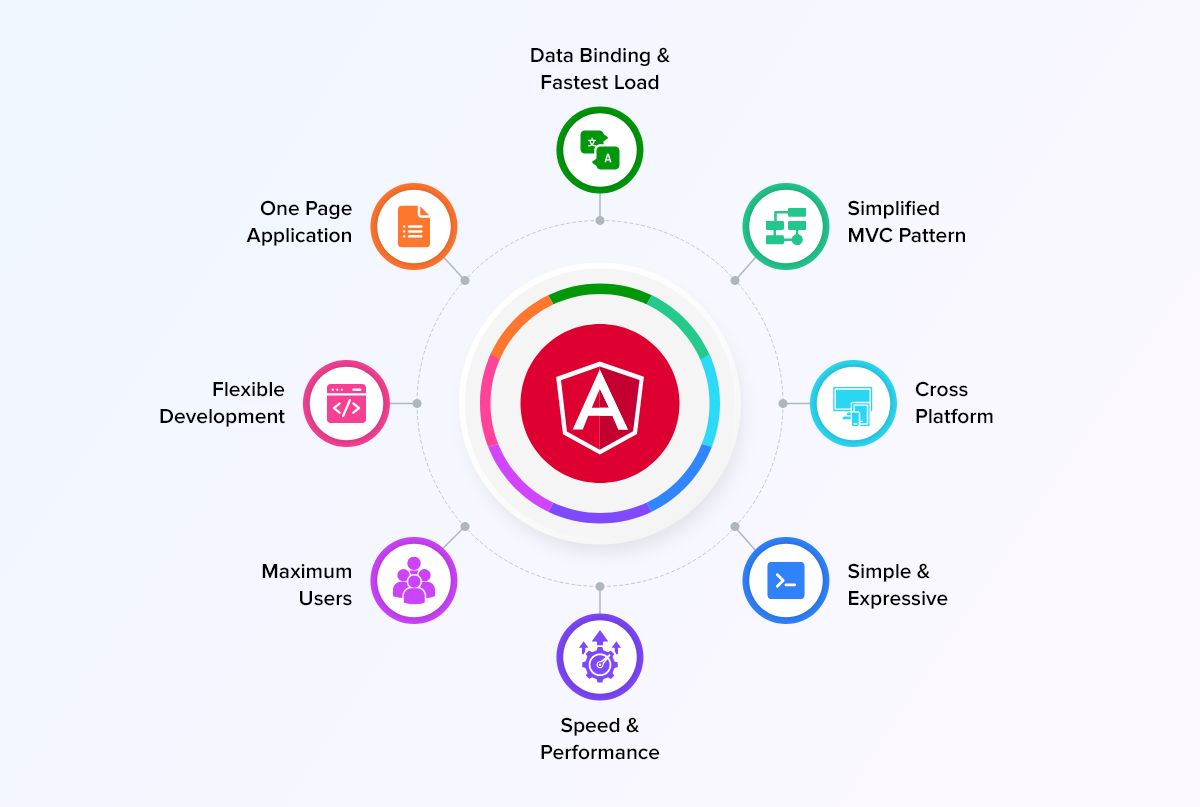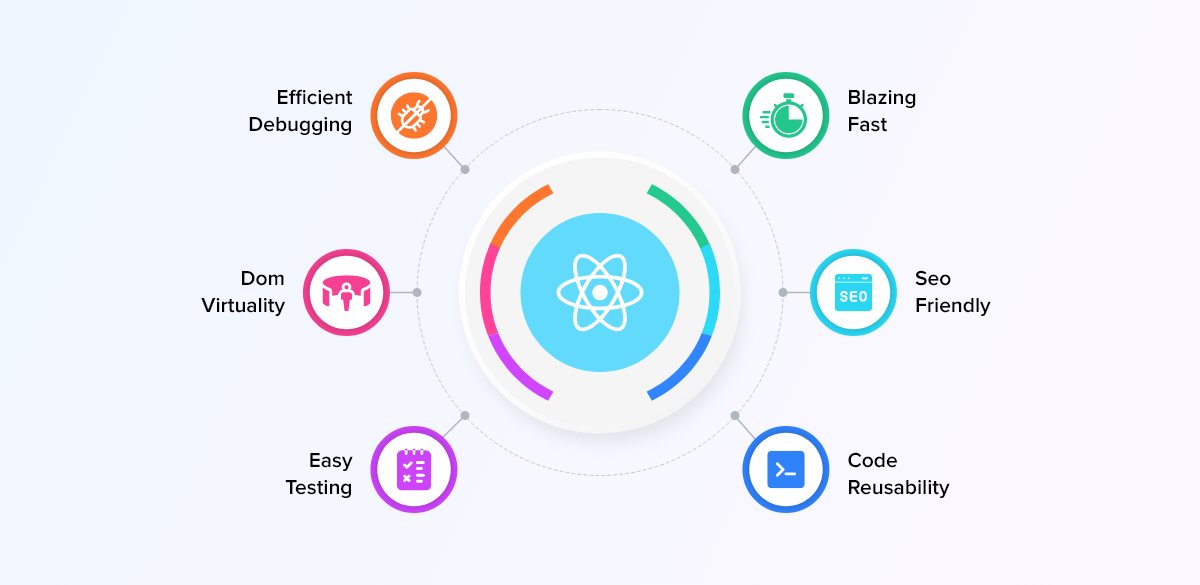Angular Vs React: Which One is Best for your App in 2025?

Angular and React are both powerful front-end programming languages popularly known to build modern and complex web app interfaces.
In fact, a recent report by Statista claims that people use almost 1.88 billion websites. Among them 42.62% of the websites were built with React and 20.39% were built with Angular. Eventually, the usage of these frameworks are drastically increasing.
Well, now the question is – Which language would you choose between Angular vs React?
So, in this article, we’ll dive deep into the features, budget, development time, learning curve, and benefits of these javascript programming resources to help you make an informed decision. Let’s get started!
Table of Contents
What is Angular?
Angular or Angular 2 (formerly AngularJS) is an open-source structural framework built and maintained by Google since 2010. This framework uses TypeScript and HTML to build web apps, single-page web apps, and hybrid apps, mostly for large-scale businesses.
Globally popular projects like Microsoft Office Home, BMW Cost Calculator for Driveaways, Xbox, Forbes, and Samsung are built with Angular.
Advantages of Angular

Here are the benefits of using Angular as the framework for your apps:
- Renders a vast range of templates with it extensive libraries.
- Supports single-routing.
- You can perform behavioral inspection by injecting mock data into the controller.
- It can offer you extension of HTML.
- The code development is super-clean with Angular.
- It helps you develop user interfaces with data binding.
- You can create reusable components with Angular.
- Lets you create single pages, connect them with components and deliver the final product.
- It provides dependency injection.
How Is Angular Better Than React?
- Full Stack Framework
- Dependency Injection
- Two-way Data Binding
- Model-View-Controller (MVC)
- Application Architecture
What is React?
React (or Reactjs/ ReactJS) is also a front-end Javascript library developed and maintained by Meta (formerly Facebook). This framework is used by programmers to build the (UI)User Interface of their apps, from individual features to complete components.
Above this, React library codes are reusable and have virtual DOM and JSX. As exciting as it sounds, the code drastically cuts down the development time and saves you from a huge spend. Sounds great right?
Advantages of React

Below are the benefits you’ll achieve when you choose to React as your app’s framework:
- The design is simple and easy
- Deliver powerful performance with React Native Library
- The framework is view-oriented
- App migration is quite easy and smooth
- In both server-side and front-end, the updates are rapid
- You can easily debug your app with React
- Supports both Android and iOS
- You can reuse the ReactJS codes
- The framework is easy to learn
How Is React Better Than Angular?
- Isomorphic JavaScript
- JavaScript XML
- One-way data binding
- Flexibility of Codes
Angular Vs React: A Complete Overview!
Both Angular and React are well-known Javascript frameworks used for building web and mobile applications. Angular was written in typescript, and React is in the Javascript library. They have certain similarities, such as the fact that Angular is well-suited for building complex websites and React for customizable websites.
| Angular | React | |
|---|---|---|
| Released in | 2009 | 2013 |
| Released by | Meta (Formerly Facebook) | |
| Founded by | Misko Hevery | Jordan Walke |
| Written in | TypeScript | JavaScript |
| Technology Type | Written in Javascript with a complete Model-View-Controller framework | Javascript library |
| Data Binding | Two-way | One-way |
| DOM | Real/Traditional | Virtual |
| Language | Javascript + HTML | Javascript + JSX |
| Learning Curve | Steep Learning | Moderate |
| Stars in Github | 84.6K | 8.1K |
| UI Rendering | Both client and server-side | Both client and server-side |
| Well Suited For | Interactive apps | Apps that are larger and works with recurrent variable values |
| App Structure View | MVC | Component-based |
| Dependency Injection | Complete Supported | Unsupported |
| Used for | Large scale apps | Customizable apps |
| Reusability | Not every code is reusable | Yes |
| Used by | IBM, Upwork, Paypal | Facebook, Skype, Instagram, Walmart |
- Angular was developed by Google, and React was developed by Facebook.
- Angular JS is a framework based on Type-script, whereas React is a library based on Javascript.
- Angular JS is an open-source platform, while ReactJS is an open-source library.
- React JS is built using JSX, while Angular is built using TypeScript.
- Most developers use Angular to build business apps that are progressive and single-paged, while they choose React.js to build highly responsive UIs.
- You can create dynamic websites with Angular since it belongs to the MEAN stack. Whereas, you can opt for React to build a front end with reusable HTML elements.
- While comparing React JS vs Angular to build single-page apps, AngularJS uses HTML and TypeScript, and React JS uses isolated components.
- React is comparatively easier to learn than Angular.
This is a basic differentiation to understand the nature and capability of the frameworks. Now, let’s move on to a more detailed comparison.
Detailed Comparison: Angular vs React
Now that you know how basically Angular differs from React, it is time to get in-depth and analyze more crucial factors in the development environment. In this section, we will discuss how these Javascript frameworks work, their features and unique characteristics, to gain clarity on which is best for your requirements.
1. DOM
If you need to change the structure, content and style of a HTML document, you’ll have to use Document Object Model, in short, known as DOM.
This model is a programming interface which represents web pages as nodes and objects in a tree structure. This organization of the web page data lets you create, change, or remove elements in your project, as per your needs.
| Angular | React |
|---|---|
| Angular operates on traditional or real DOM. | React uses virtual DOM |
| Say, you need to change your email information on the page. Angular’s real DOMs update the entire HTML table structure until it reaches the email information for change. | Lets you instantly access or edit the HTML document virtually. |
| Causes potential issues with the performance and speed of the web pages. | No matter the size of the app, virtual DOM makes React JS perform much faster than traditional DOMs. |
Eventually, due to the speed and reliability, Developers prefer React DOMs for the coding architecture over Angular.
2. Data Binding
How do you synchronize the UI components on the user-side to the data sources in the backend of your app?
Well said! Data Binding does it with ease using declarative formats.
But how each data is bound in Angular and React pretty much differs from each other in terms of performance and process. Let’s look into the differences:
| Angular | React |
|---|---|
| Angular uses both two-way data binding computations. | React uses one-way binding computations. |
| Bi-directional or Two-way binding is an approach where a change in the UI element will correspondingly cause a change in the model’s state. | Unidirectional or One-way binding is when a change is updated in the UI element, it changes affect the model state. |
| Conversely, any change in the model state reciprocates an equivalent change in the UI elements. | But the point is, the binding process stops here, and does NOT happen the other way around. |
While this may sound like Angular’s two-way approach is much better, it turns out that bi-directional binding throws complexities into managing the UI elements and model states, as your app scales over the years.
On the other hand, React is preferred to be the most favorable library for larger and complex projects for its effective code management and debugging
3. Component Flow
In order to build an app with smooth user experience, you’ll need frameworks that can sort your app’s components in an orderly fashion.
In simple terms, you need a clear structure so that you can store the reusable components in your library and drop them into your app wherever and whenever needed.
In this case, React and Angular differ vastly in their architectural approach.
| Angular | React |
|---|---|
| Angular is a complete framework by itself comprising unique features. It has Angular CLI (Command Line Interface), RxJS (reactive programming with Javascript), and Angular Universal (used on the Server-side) | React breaks each UI component to structure them into a more complex components to perform desired functionalities. |
| Uses web components for activities like transpiring. | To bring these components to complete operation, you’ll need several other integrations and support tools like Webpack (module bundler), Redux (state container), and Babel (JSX into JS transpiler). |
Although React is robust, it demands multiple support integrations to perform its fullest. So, here I’ll give it to Angular.
4. Testing Framework
Any app or software has to be subjected to testing to verify and analyze if it does what it is built for. The founders of React and Angular use different frameworks to test each of them.
Here’s what I got to know:
| Angular | React |
|---|---|
| Google uses a framework known as Jasmine to test Angular. | While Facebook tested React, it used Jest. |
| Developers found this testing inflated the process and made it much more difficult to understand. | This framework is easy to use and is developer-friendly since it does not require any configuration to perform its operations. |
As claimed by the developers as “delightful JavaScript testing”, with absolute clarity, let’s call it React here.
5. Learning Ease
Would you like to learn the technologies Angular or React? While your interest to grow proficient peeks into research, you’ll need to understand that each of these languages have their distinct features.
| Angular | React |
|---|---|
| In small-scale projects, Angular tends to be easy to grasp. | Regardless of the project size, React seems to give difficult beginnings. |
| However, in large-scale projects, Angular turns complex due to its two-way flow | But its consistency of UI and model states keep the complexity of the framework at sane levels even for larger projects. |
The unidirectional binding keeps React simple and stable throughout the project flow. So , it would be fair to call it React here.
6. Load Time
The app load time depends on the size of the files used to construct them. These files consist of bundles which must be relatively small in size to load faster and increase the app ‘s conversion rates. React and Angular deals with the bundles sizes in different approaches, as you may find below:
| Angular | React |
|---|---|
| Angular eliminates the development utilities and unused modules from the users’ app. | As for React, it uses a support tool – webpack to split the code into smaller pieces of code. |
| It also optimizes the bundle size further by compression and minification of files. | It also performs on demand code import and dead code elimination to reduce the size of each bundle in the app. |
Does it sound like a tie to you? Well it is!. Angular and React, both take the win with effective load times by bundle size reduction.
7. Scalability
When your app grows, the technology you choose must expand accordingly. So, it is necessary to keep in mind about the scope of your project in the coming years before you arrive at a decision on your tools.
| Angular | React |
|---|---|
| Angular is a full-featured model-view-controller (MVC) framework that comes with all the essentials that developers need. | As mentioned earlier, React depends heavily on third-party integrations which makes it easy to scale when your app grows. |
| It allows you to scale your existing app by just adding new functionalities. | In fact, global giants like Facebook and whatsapp use this technology for their projects. |
Its best to put to test – the stability of the architecture when the app scales. And React will win for large scale projects.
Recommended Reading
8. Version Updates
To keep your app fresh with modern features your users expect, you need new technologies and modules. And to do this, your frameworks and libraries must be compatible for the updates and releases.
| Angular | React |
|---|---|
| When you need to make a switch from an older version to the latest one in Angular, first you need to install the updates between every version. | In contrast, React has complete backward compatibility. |
| It is not possible to make leaps without updating to the consecutive versions. | React lets you update the older versions and update different releases to enhance your project. |
Without a doubt, React might be the best choice if you are looking to update your app versions instantly.
Angular vs React Popularity
According to Statista, React.js, and Angular are popular JavaScript frameworks, libraries, and tools for developers worldwide. React.js is currently the most widely used at 40.14%, and Angular is also widely used at 22.96%.
React vs Angular: When To Choose The Frameworks?
We’ve done a fair enough analysis on Angular and React. Now let us discuss the spot-on features for choosing which framework/ library best works for you.
When Should You Choose React?
- You have good knowledge in CSS, HTML and JavaScript
- The elements in your app should be reusable
- You need to build an app with multiple events.
- You need to build a personalized app.
When Should You Choose Angular?
- You are proficient in C#, Angular and Java
- You need pre-built solutions and high-level production capacity
- The complexity of your app is low-medium
- You need to build a business-level app with enhanced features
Angular or React: Which is Best For Your App?
Among developers, both React and Angular are highly popular and are used for different development scenarios. However, when the choice is only one – we’d undoubtedly call React better than Angular, as a technology. Undoubtedly, ReactJS development services is a favorite choice of a lot of programmers in the app development industry.
One of the main reasons that developers choose React over Angular, is because it has a Virtual DOM and offers customizations and optimizations. It is easy to learn, simple to install and enables a smooth migration.
Overall, React is the flawless savior of time for many developers around the world. So, when you choose between React vs Angular, you’ll need to get deeper into analyzing your requirements, usage and functionality. Hope, you’ve got what you’ve been looking for!
The Final Call
As mentioned above, although both Angular and React let you build professional-grade web apps, each of them have their own pros and cons based on the size of the project.
The above comparison criteria showcase that Angular fights tough against react on small-scale apps. But, React stands at the top with tons of advantages like virtual DOMs and optimizations, as mentioned in the article. Finally, with this technology, developers have an immense range of opportunities to eliminate errors and speed up development.
As experts in building APIs in both Angular and React, we’d like to extend our support in choosing the right framework for your apps. Talk to us and let’s build amazing features into your apps together!
Get Started with MirrorFly’s Secure React or Angular SDK!
Drive 1+ billions of conversations on your apps with highly secure 250+ real-time Communication Features.
Request Demo200+ Happy Clients
Topic-based Chat
Multi-tenancy Support

Frequently Asked Questions (FAQ)
React is a JavaScript library, while Angular is a JavaScript framework that uses TypeScript. In terms of data handling, React uses one-way data binding and virtual DOM trees, while Angular uses two-way data binding and real DOM. Additionally, React is faster than Angular because of its small bundle size.
While both Angular and React JS are great front-end development tools, developers prefer React over Angular because of the ease of debugging files that helps us to achieve better app stability. Plus, React JS makes use of libraries and so, we can integrate those libraries into any project even if the project is developed using Angular.
React is said to beat Angular on factors like backward compatibility, data binding, time, cost, bundle size, and the ability to reuse components. Developers prefer to React over Angular as the former language uses one-way binding making the code stable and debugging easier.
As React uses virtual DOM, it allows devs to update changes without the need to rewrite the entire HTML doc. Thus rendering faster updates and performance. Secondly, React JS tends to split codes into smaller sections, thereby taking less time to load, gets ranked highly, and converts soon.
Related Articles
- How to Build A Flutter Video Call App in 2025?
- How to Build a React JS Video Chat App in 2025?
- How to Build an Android Voice and Video Calling App Using Java?
- Communication APIs: Top 7 In-app Chat, Voice & Video APIs
I think very very detailed article for those who try to build app using angular vs react in 2023. There are some drawbacks in each platform so you should choose any of them carefully.
This one of the best article about angular vs react performance I’m looking for. Thanks for sharing this with me and keep up the good work and very detailed information about Angular and React
choosing angular js vs react js for app development is becoming harder than before, but with the help of this post, I am sure many will find it convenient to use. Thanks for sharing these great ideas with us!
Interesting Articles! Thanks for the sharing I am also looking for the comparison for angularjs vs reactjs. I will pin your post and uses one of these difference between angular and react.
Excellent article. As I would see it, extraordinary compared angular vs react popularity, you make EVERYTHING so easy to understand. Thank you soooooo very much. You speak to the very experienced and the professional.
Hi, this is indeed a great article!
I just would like to know if there are any FREE chat API you know to build online chat apps for the web.
Interesting Articles! Thanks for the sharing I am also looking the comparison for React vs Angular. I will pin your post. Thanks
Hello Lina, thanks for your words! My best wishes to you.
Best article. As I would see it, extraordinary compared Angular and React , you make ALL so easy to understand. Thank you very much.
Thanks Shahid, this is indeed a great response to my article. Please keep coming back for more such insights.
An amazing tech content for comparison for Angular vs React and a perfect verdict. Good one Krishi…
Thanks a ton Rinu! My best wishes to you.
Great article Krishi! Thanks for sharing the outstanding comparison of Angular vs React… In my opinion, react is the great one based on its popularity and simply that it’s only a library.
Thanks, Ashraf! Please keep coming back for more insights on developer-related blogs.
Thank you for the excellent breakdown of the key pros and cons of the React vs Angular! React is much easier to study due to its simplicity in terms of syntax. Engineers simply want to not forget their HTML writing abilities and that’s it.
Very grateful for your response Rishwanth! Best of luck!!